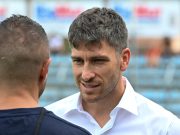When Andrea Radrizzani managed to convince and appoint Marcelo Bielsa as the new Leeds United manager, the whole club changed.
Driven by data in a lot of his work, the Argentine turned the team around quickly and efficiently, taking the Elland Road side back to the Premier League, and now Nottingham Forest want to emulate this.
Sacking Chris Hughton and replacing him with Steve Cooper, Forest saw a quick upturn in results and form, exemplified by their strong and decisive performance against Leicester City in the FA Cup, walking away with a 4-1 win and comfortably knocking out top-tier opposition.
One man who is partially responsible for this, other than the manager himself, is Georgios Syrianos, currently down as the club’s head of recruitment, whose decisions in the summer to allow the likes of Rodrigo Ely, Samba Sow, Abdoulaye Diallo and many others leave, all the while recruiting younger replacements, such as Braian Ojeda, Xande Silva and most recently Jonathan Panzo, have paid off.
Interviewed by Kicker, the 32-year-old gave some background to his appointment, and why he left VfB Stuttgart for Nottingham Forest.
He said: “The club wanted to improve the recruitment area in the long-term and develop a strategic realignment – give young, viable players a stage to achieve sporting success on an economically healthy basis. At the same time, Forest wanted to take a more analytical and process-oriented path – a path that previously led Brentford, Brighton and Leeds United to the Premier League.”
Forest failed to win any of their first seven games, picking up their first win on match day eight: “In the summer, we allowed ten players with an average age of 30 years to leave and added ten new boys with an average age of 23.
“Getting used to it takes time, but we deliberately chose this path and knew that this process could be accompanied by pain. The path with young, viable players is almost without alternative for emerging clubs like us. Internally, the start was a big challenge because the expectations of all of us were different.”
As for how he intends on using data to beat the competition, Syrianos gave some insight on the process that takes place behind the scenes at City Ground to get that advantage over the others.
He explained: “We buy raw data that is utilised with the help of a model I co-developed and then presented by a specially designed app for all decision-makers. This applies to the scouting of players as well as to the statistical evaluation of coaches. We can internally make medium and long-term forecasts about players and their performance.
“With managers, we can assess whether they fail, meet or exceed expectations of their squad – at the same time, we can explore the manager market based on the different playing styles. In the end, however, every concept must be applied in a practical manner. Theoretical advantages do not help you if they are not implemented and applied – after all, we want to make better decisions in practice and not only in theory.”


























